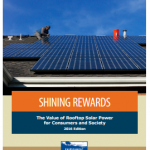Shining Rewards
The Value of Rooftop Solar Power for Consumers and Society
Solar panels provide pollution-free energy that delivers far-reaching benefits to the environment and the electric grid, said a new report by Environment New Jersey Research & Policy Center. The report outlines how solar panels on homes, schools and businesses often provide more benefits than they receive through programs like net metering from utilities.
Downloads
Environment New Jersey Research & Policy Center

Solar panels provide pollution-free energy that delivers far-reaching benefits to the environment and the electric grid, said a new report released today by Environment New Jersey Research & Policy Center. The report outlines how solar panels on homes, schools and businesses often provide more benefits than they receive through programs like net metering from utilities.
“Solar power provides tremendous benefits to New Jersey’s environment and all electric customers,” said Carli Jensen, Environment New Jersey’s campaign director. “We should be encouraging even more solar, to reduce pollution and lower energy costs.”
The Environment New Jersey Research & Policy Center report, Shining Rewards: The Value of Rooftop Solar Power for Consumers and Society, comes as Newark joins a growing list of cities across the country participating in the U.S. Department of Energy’s Better Communities Alliance—a collaboration of local governments, businesses, nonprofit organizations, and foundations working together to advance renewable energy on a local level. Newark is currently the leading city in the Northeast region for solar installations, and number 16 nationwide.
New Jersey State Assemblyman Tim Eustace, President and CEO of Advanced Solar Products, Inc., Lyle Rawlings, and Executive Director of GRID Alternatives Tri-State, Peter Mandelstam, joined Environment New Jersey in issuing this statement to release the report’s findings.
“Clean energy alternatives are vital to our future, both for the environment and for our economy,” said Assembly Environment and Solid Waste Committee Chairman Tim Eustace. “We must make New Jersey a leader in solar energy and renewable energy, and it’s important that this goal become a focal point of our public debate in months and years ahead. If we miss this opportunity, both our environment and our economy will suffer.”
Solar energy on rooftops can help communities to avoid greenhouse gas emissions, reduce air pollution harmful to public health, and create local jobs, the report shows. Net metering programs credit solar panel owners when they generate more power than they use, providing electricity for other customers. Utilities then credit solar panel owners a fixed rate – often the retail price of electricity – for providing excess power to the grid, similar to rollover minutes on a cell phone plan.
The arrangements have helped solar energy grow significantly, with the U.S. installing its 1 millionth solar installation in May of this year. Across New Jersey, net metering has helped residents of all income levels go solar and lower their energy bills, earning credit for the extra energy they send back to the utility each month.
“The studies reviewed by Environment New Jersey, particularly those concerning New Jersey and the Northeast, predicted what we’re already starting to see in New Jersey: that solar power can create jobs and economic growth while putting downward pressure on wholesale peak power prices,” said Lyle Rawlings of President and CEO of Advanced Solar Products, Inc. “These benefits, together with reduction in the costs of regional pollution and greenhouse gas pollution, exceed the cost of solar incentives. But the rules of the energy market are not set up to pay for these benefits. Therefore, government has a role in providing the incentives – but they should be seen as a payment for a service, not as a subsidy.”
Environment New Jersey’s report examines 16 studies on the value of solar energy. The studies show that the dollar and cents value of solar is often higher than the credit utilities provide to customers, despite claims from some utilities that the arrangement represents a subsidy from non-solar users.
Of the 16 studies reviewed, 12 found that the value of solar energy was higher than the average local residential retail electricity rate. The median value of solar power across all 16 studies was around 16 cents per unit, compared to the nation’s average retail electricity rate of about 13 cents per unit.
In other words: solar customers often provided more benefits than they received in credits.
“Rooftop solar users are givers, not takers, when it comes to the value they provide to society and the electric system,” said Jensen. “In many cases it appears that solar programs are a bargain for utilities, not a burden.”
All 16 studies found that solar panel users offered the electric system net benefits.
Solar advocates hoped today’s report would shed new light on the way net metering and low income solar programs can benefit communities in Newark and all throughout the state of New Jersey.
“Solar can have tremendous benefits for low-income communities, providing long-term energy costs savings for families and high-growth job opportunities,” said Peter Mandelstam, Executive Director of GRID Alternatives Tri-State. “Here in New Jersey, GRID is continuing to collaborate with community organizations, local governments and utilities to make sure everyone has access.”
As New Jersey’s solar program grows, solar policies like net metering will continue to impact how all New Jerseyans can access and benefit from solar energy.
“There’s so much to gain by going big on solar,” said Jensen. “Let’s make sure we take full advantage of all the benefits by allowing solar continue to grow in Newark, across the state of New Jersey, and all across the country.”
###
Environment New Jersey Research & Policy Center is a statewide advocacy organization bringing people together for a cleaner, greener, healthier future. www.environmentnewjerseycenter.org
